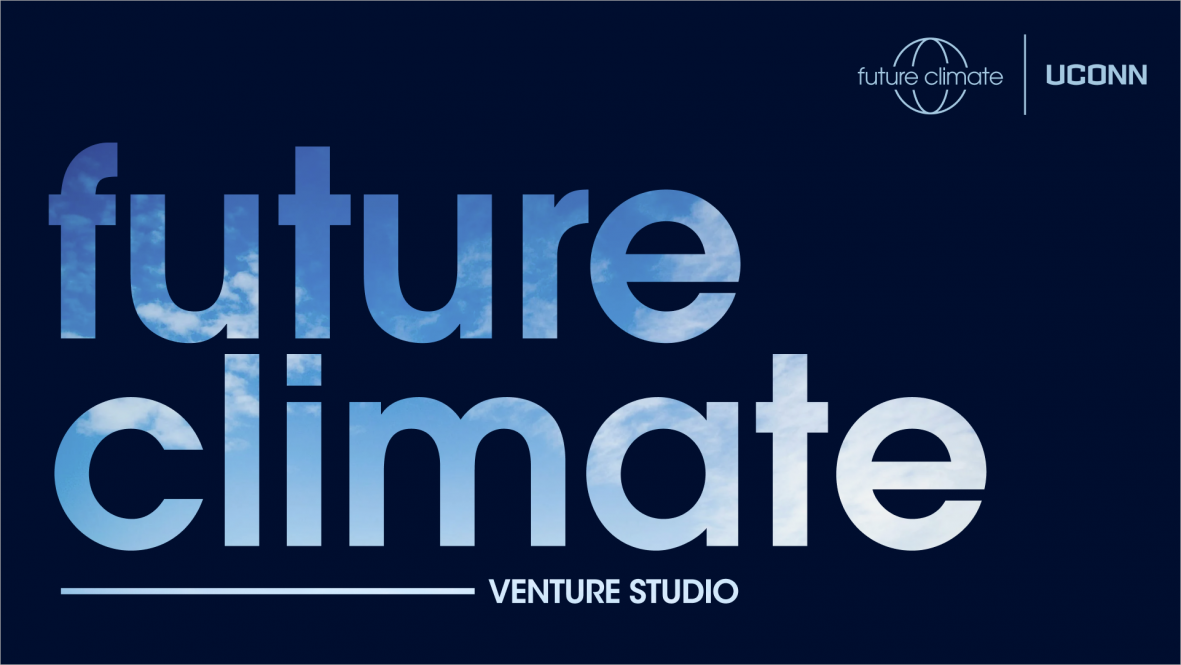UConn and its partners are taking aim at one of the defining challenges of the 21st century with their newly announced Future Climate Venture Studio.
The Studio will work to identify and accelerate the growth of companies dedicated to combating climate change and fostering sustainability, encompassing startups at different stages of growth. UConn is partnering with R/GA Ventures, a leading venture studio operator and early-stage investor; and CTNext, a state agency dedicated to public-private partnership to catalyze Connecticut’s innovation ecosystem.
“UConn is proud to lead this unique effort to address the most important challenge of our time,” says UConn President Radenka Maric, a renowned expert in clean energy engineering and technology. “The University offers unparalleled expertise in all dimensions of climate science and research through our School of Engineering; College of Agriculture, Health, and Natural Resources; College of Liberal Arts and Sciences; and climate and renewable energy research at its Avery Point campus.”
The multi-year initiative will provide the startups with critical access to technology, research, connections, and networking with industry and corporate partners. In addition to considerable financial opportunities, the startups will have the support of UConn’s experts and corporate partners at the Innovation Partnership Building (IPB).
The studio will seek companies specializing in several areas related to climate research, innovation, and technology, including:
- Mitigation, such as carbon technology, geoengineering, and blue technology
- Adaptation, including ecosystem management, agriculture, and industry and manufacturing
- Energy, such as alternative energy sources like hydrogen and fuel cells, distributed energy, and battery storage and performance improvement
- Human factors, including food, water, and transportation systems and disparate impact
Investor-in-Residence Cody Simms, a partner at MCJ Collective, will lead the Studio. MCJ Collective is a media platform and investment fund that powers innovative climate solutions.
“Climate change is an immense global challenge, and it has been inspiring to see so many entrepreneurs turn their attention toward the myriad solutions that need to be developed across sectors and industries,” said Simms. “Decarbonizing the planet requires rethinking some of our global economy’s biggest sectors — from energy to food to transportation to manufacturing — and the imminent threat of climate change creates entrepreneurial opportunity to make a huge impact and build lasting businesses.”
The Studio is the latest in a series of investments and initiatives for UConn as it establishes itself as a leader in climate change and clean energy research and innovation. Working with other institutions and industrial leaders, the University has expanded its influence and worked lockstep with state leaders toward the goal of net zero carbon emissions by 2040.
In May, UConn welcomed U.S. Energy Secretary Jennifer Granholm to campus to the IPB, where President Maric drove the secretary and Congressman Joe Courtney to the Center for Clean Energy Engineering (C2E2) in a fuel-cell powered sedan. Granholm lauded the University an example for the rest of the nation to follow.
The federal Department of Energy is accepting applications for $7 billion in funding for the development of regional “Hydrogen Hubs.” In August, UConn announced its membership in a six-state, multiagency and university consortium seeking to establish a hydrogen clean energy hub in the Northeast. As a strategic partner, UConn joins the effort to help convert the region to a clean energy infrastructure, with significant implications on the environment, workforce, and industry.
“The Climate Venture Studio perfectly aligns with UConn’s mission to contribute valuable research toward clean energy production and reducing dependence on carbon-based fuels,” says Pamir Alpay, UConn’s interim Vice President for Research, Innovation, and Entrepreneurship. “Our faculty and students are committed to the solutions that will steer us toward a cleaner energy future.”
Additional partners involved in the Studio include CT Innovations, the state’s venture capital arm; Connecticut Green Bank, which accelerates the flow of private capital into markets that energize green economy; the Connecticut Public Utilities Regulatory Authority; the Oracle Corporation; investors Cimbria Capital, Nexus Venture Partners, and more.
The Studio is now accepting applications on its website for the 2023 fiscal year.



